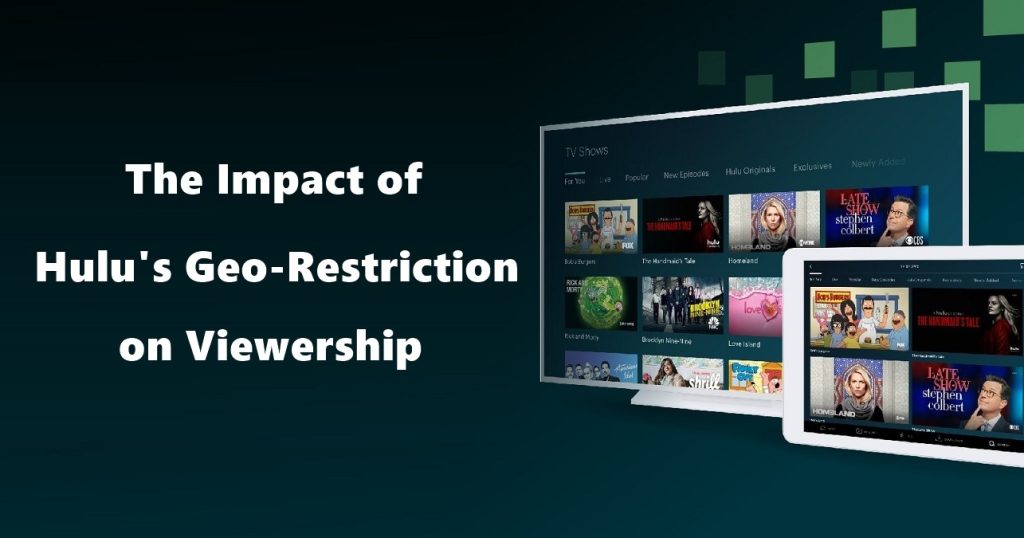Hulu is one of the most popular streaming services in the United States, offering a vast library of TV shows, movies, and original content. However, like many other streaming services, Hulu has implemented geo-restrictions, which limit access to its content based on a viewer’s location. This article will explore the impact of Hulu’s geo-restriction on viewership and discuss the various factors that influence it.
Geo-Restriction: A Brief Overview
Geo-restriction is a practice used by many streaming services to restrict access to their content based on the location of the viewer. This practice is commonly used to comply with licensing agreements and copyright laws in different countries. Geo-restriction has become increasingly common in recent years due to the growth of the streaming industry and the rise of global content distribution.
The Impact of Hulu’s Geo-Restriction on Viewership
The impact of Hulu’s geo-restriction on viewership is significant. While Hulu has a large audience within the United States, its geo-restriction policy limits its reach outside the country. This means that viewers outside the United States are not able to access Hulu’s full library of content.
Viewership Loss
Geo-restriction can lead to a loss of potential viewership and revenue for Hulu. According to a study by MUSO, a piracy tracking firm, geo-restriction is one of the main factors that drive piracy, particularly among viewers outside the United States. The study found that a significant percentage of Hulu Philippines viewers resort to piracy to access its content.
In addition to piracy, geo-restriction can also lead to viewer frustration, as many people may be unaware of the policy and try to access Hulu’s content from other countries. This can result in a negative user experience and could potentially damage Hulu’s reputation.
Factors that Influence Geo-Restriction
Several factors influence Hulu’s geo-restriction policy. Some of these factors include:
Licensing Agreements
Licensing agreements with content providers dictate which content can be streamed within the United States. These agreements are often limited to specific regions, which means that viewers outside the United States cannot access certain content.
For example, Hulu’s licensing agreement with the BBC limits its ability to stream Doctor Who outside of the United States. As a result, Doctor Who fans in other countries cannot access the show on Hulu.
Copyright Laws
Copyright laws vary from country to country, and streaming services like Hulu must comply with these laws to avoid legal issues. For example, some countries have stricter copyright laws prohibiting streaming certain content.
Hulu’s geo-restriction policy may also be influenced by the potential legal risks of streaming content in certain countries. For example, suppose a particular show or movie is banned in a specific country due to copyright issues. In that case, Hulu may be unable to offer that content in that country due to licensing restrictions.
Regional Competitors
Hulu’s geo-restriction policy may also be influenced by regional competitors. For example, suppose a streaming service has exclusive streaming rights to a particular TV show or movie in a specific country. In that case, Hulu may be unable to offer that content in that country due to licensing restrictions.
For example, in the United Kingdom, Hulu faces competition from local streaming services like BBC iPlayer and ITV Hub. These services have exclusive rights to some of the content that Hulu offers in the United States, which limits Hulu’s ability to offer that content in the UK.
Virtual Private Network (VPN)
A VPN is a popular method for bypassing geo-restriction. VPNs allow users to connect to a server in the United States and access Hulu’s content as if they were physically located in the US.
However, using a VPN to bypass geo-restriction may be illegal in some countries. Additionally, Hulu has implemented measures to detect and block VPNs, which means that not all VPNs may work with Hulu.
Proxy Servers
Proxy servers work in a similar way to VPNs, allowing users to access Hulu’s content by connecting to a server in the United States. However, like VPNs, proxy servers may not always work with Hulu, and their use may also be illegal in some countries.
Smart DNS
Smart DNS is a service that allows users to access Hulu’s content by changing their DNS settings to a server in the United States. Unlike VPNs and proxy servers, Smart DNS does not encrypt traffic, which means that it may be faster than other methods.
However, Smart DNS may not work with all streaming services, and its use may also be illegal in some countries.
Conclusion
Hulu’s geo-restriction policy has a significant impact on viewership, particularly among viewers outside the United States. While geo-restriction is often used to comply with licensing agreements and copyright laws, it can lead to a loss of potential viewership and revenue for streaming services like Hulu.





